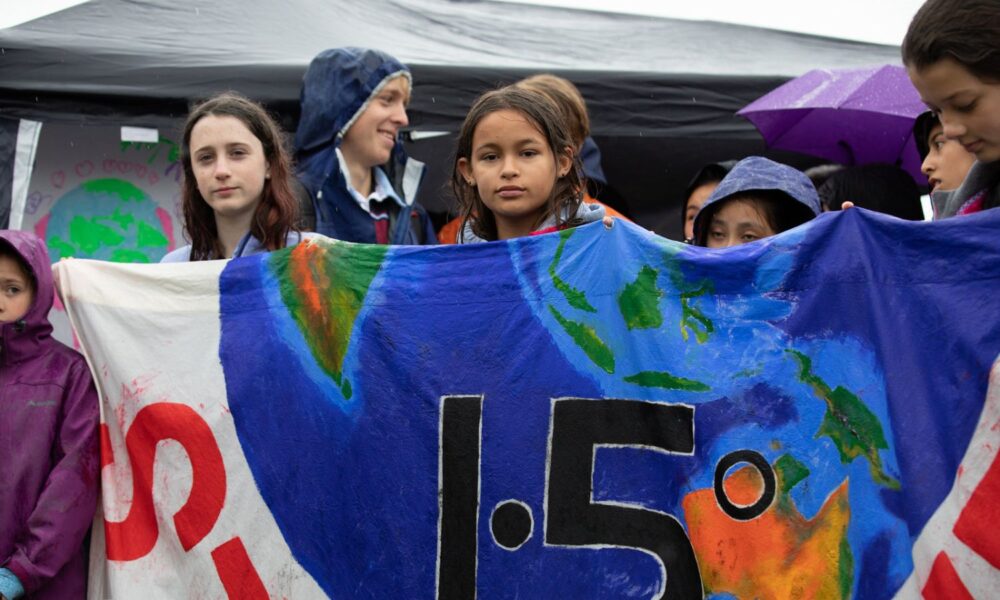If there’s one thing I’m hearing over and over again from the activists, teachers, counselors, and fellow parents in my life, it’s that our kids aren’t all right.
This observation is backed by the U.S. Surgeon General, who issued a warning in late 2021 that today’s challenges—including climate change, racial injustice and more—are wreaking “devastating effects” on our young people’s mental health.
This Mother’s Day, nestled in the middle of Mental Health Awareness Month, I’m deeply disturbed by this growing public health crisis among our young people, and how it’s playing out across society.
As a mom leading an organization dedicated to leaving a healthy, safe, and just planet for the next generations, I’m also acutely aware of how mental health connects with UCS’s mission.
Of course, UCS doesn’t work on mental health directly, but healthy minds and spirits are the bedrock of an engaged and critically thinking public. Our ability to create a livable future will continue to require deep reserves of insight, creativity, resilience, and resolve from all of us, but especially from the next generations.
Thanks to my own experience as the mother of an extraordinary daughter who is courageously open about her bipolar diagnosis, I’ve deepened my own insight and resolve, and feel compelled to speak out about mental health.
One important thing I’ve come to understand is what a pernicious role stigma plays in this battle. Many deep structural barriers including racial and economic marginalization also complicate this public health epidemic. I believe that being open and honest about what we’re up against, and sharing lessons and resources, are important steps forward in our fight to create a livable world.
Children bear the heaviest burden of climate grief
The long decline in youth mental health has been tracked for several years; the downward trend was apparent pre-pandemic. Social media is one driver, as young people feel pressure to live up to unrealistic standards, and are bullied and excluded. And the suffering inflicted by COVID-19—deaths of family members, loss of income, the stress of remote schooling, and isolation in lockdowns—has only exacerbated the trend.
Beyond these contributing factors, many, many young people worldwide have taken on what should be the adult burden of worrying for their futures, as they learn about climate change and what it will take to hold on to a livable planet. Disconcertingly, many see the grown-ups in their lives falling short. They’re losing hope—another quality we desperately need to keep fighting.
Research published in The Lancet in 2021 found that in a survey of 10,000 young people from around the world, 84% were worried about climate change, with 59% very or extremely worried. More than half of the respondents reported feeling anxious, angry, guilty, helpless, powerless, and sad. And more than 45% of respondents said their feelings about climate change negatively affected their daily life and functioning.
One young person’s heartbreaking words captured in the survey reflect the genuine angst and pain our children are feeling: “I don’t want to die,” they said. “But I don’t want to live in a world that doesn’t care about children and animals.”
Anxiety, helplessness, and sadness about climate change—known clinically as climate grief and climate anxiety—are also adult phenomena. According to a Yale University and George Mason survey conducted late last year among more than 1,000 people in the US, about one in ten reported experiencing symptoms of anxiety because of global warming for several or more days in the previous two weeks, with almost as many experiencing symptoms of depression because of global warming. More than one in four respondents said they try not to think about global warming, and about one in ten said they often have trouble stopping themselves from consuming bad news about climate change and have sought social or emotional support to help manage their related concerns.
There’s no shame in feeling climate grief and anxiety. My colleagues and I feel it every day. But we must figure out how to treat it at the scale our times demand, before it becomes even more of an impediment to building the world we all want to live in. If our children have lost hope, if we cannot care for ourselves—or can only care for ourselves—we cannot live up to the demands of our time.
Staying hopeful
Despite the dire picture here, the beating heart of today’s climate movement is still our youth. The incredible organizing skills, high-profile actions, and moral clarity that young people bring to climate activism keeps me hopeful and optimistic.
In the US, I’m inspired by countless actions that young people are taking to fight for their futures, including these students who traveled to the Washington, D.C., last month and met with leaders to advocate for funding for youth mental health resources tied to climate anxiety. (You can sign their petition to add your support for their demands.)
Worldwide, I draw hope from activists like Vanessa Nakate, who uses her position as United Nations Goodwill Ambassador to bring attention to the ways that African countries are at risk of severe climate impacts and are innovating to respond to them, and the Australian teenagers who brought a class-action lawsuit against the country’s environmental minister in an attempt to prevent new fossil fuel development, among many others.
But we can’t put the onus on children to solve the problems they didn’t create. We must meet their urgency with our own: the best thing we can do for the mental health and safety of every child is to deliver on our promises to urgently cut emissions, fund meaningful resilience measures, and meet change with compassion and honestly as we prepare ourselves and our children for a changing world. As the authors of the worldwide survey of children published in The Lancet say:
“As a research team, we were disturbed by the scale of emotional and psychological effects of climate change upon the children of the world, and the number who reported feeling hopeless and frightened about the future of humanity. We wish that these results had not been quite so devastating. The global scale of this study is sufficient to warrant a warning to governments and adults around the world, and it underscores an urgent need for greater responsiveness to children and young people’s concerns, more in-depth research, and immediate action on climate change.”
While we’re working to leave a better world for future generations, we also must make space to grieve what we’ve lost, to be open about how we’re feeling, and assure young people they’re not alone in their fear and worry. And finally, we must remind them, and ourselves, of our power and agency.
Tend to your mental health
As a parent, the US-based organization National Alliance for Mental Illness (NAMI) has been an invaluable resource, and I highly recommend this book, written by NAMI’s Dr. Ken Duckworth.
For parents and young people seeking climate change-related mental health support, I love the Gen Dread newsletter, and the All We Can Save project, who teamed up to offer this list of resources for tending to climate grief and anxiety.
If you’re seeking a behavioral health provider who understands climate change-related mental health challenges, the Climate Psychology Alliance offers a provider directory, along with other supportive resources for young people and families.
And through UCS’s own Science for Public Good Fund, we have, with your support, been proud backers of the podcast Politics under the Microscope, whose hosts explore climate change and mental health (episodes 9, 10, and 11). Have a listen, and feel less alone.
The following additional resources are from my wonderful colleague Claudia Ward-de León, who put together a self-care toolbox for our staff—who, after all, must contemplate these heavy issues at least 40 hours each week:
- Do you worry about being unprepared in a disaster, like a flood or wildfire? This emergency kit comes in more than 35 languages.
- Box breathing is a quick way to regulate your nervous system if you’re feeling like you might panic. Follow along with the dot and breathe.
- Learn about the benefits of mindfulness and meditation, which can help ground you.
- “Self-care” may be an overused term, but these checklists offer true, foundational self-care, and a way to check in with yourself to make sure you’re tending to your needs.
- Similarly, this resource provides definitions of emotional, social, and even environmental self-care, so you can weigh the balance of your daily activities.
I hope this piece has given you some food for thought to share with your families, and open or deepen a conversation with the young people in your life. There is no shame in experiencing mental health challenges, just as there is no shame in grieving, and then redoubling our efforts to fight climate change. Together, we will go forward with courage and resolve.

